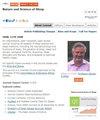Sleep Habits and Disturbances Among Tunisian Adults: A Cross-Sectional Online Survey
IF 3
2区 医学
Q2 CLINICAL NEUROLOGY
引用次数: 0
Abstract
Background: Sleep quality and disturbances have gained heightened scholarly attention due to their well-established association with both mental and physical health. This study aims to assess sleep-wake habits and disturbances in Tunisian adults.Methodology: This cross-sectional study employed an online questionnaire to assess 3074 adults ≥ 18 years. Primary outcomes, including sleep quality, daytime vigilance, mood, and subjective well-being, were measured using validated questionnaires [the Pittsburgh Sleep Quality Index (PSQI), the Insomnia Severity Index (ISI), the Epworth Sleepiness Scale (ESS), the Patient Health Questionnaire (PHQ)-9, and the World Health Organisation-Five Well-Being Index (WHO-5)].
Results: Less than two-thirds (n= 1941; 63.1%) of participants were females and the mean age was 36.25± 13.56. The prevalence of poor sleep quality was 53.8% when defined as a PSQI > 5. The prevalence of insomnia, short sleep duration, long sleep duration, EDS, severe depression, and poor well-being were 14.5%, 34.7%, 12.3%, 32.4%, 7.4%, and 40.2%, respectively. Some factors were associated with an increased likelihood of poor sleep quality, including female gender, chronic hypnotics use, internet use close to bedtime, daily time spent on the internet > 3 hours, smoking, university- level education, nocturnal work, severe depression, impaired well-being status, insomnia, and EDS.
Conclusion: The high prevalence of sleep-wake disturbances among Tunisian adults emphasizes the need for an appropriate screening strategy for high-risk groups. Individuals with unhealthy habits and routines were significantly more likely to experience these kinds of disturbances. Consequently, there is a pressing need for educational programs on sleep to foster healthier sleep patterns.
突尼斯成年人的睡眠习惯和干扰:一项横断面在线调查
背景:睡眠质量和睡眠障碍与精神和身体健康的关系已得到证实,因此受到学术界的高度关注。本研究旨在评估突尼斯成年人的睡眠-觉醒习惯和睡眠障碍:这项横断面研究采用在线问卷对 3074 名年龄≥ 18 岁的成年人进行了评估。主要结果包括睡眠质量、白天警觉性、情绪和主观幸福感,均采用经过验证的问卷[匹兹堡睡眠质量指数(PSQI)、失眠严重程度指数(ISI)、埃普沃斯嗜睡量表(ESS)、患者健康问卷(PHQ)-9和世界卫生组织五项幸福指数(WHO-5)]进行测量:不到三分之二(1941 人;63.1%)的参与者为女性,平均年龄(36.25± 13.56)岁。失眠、睡眠时间短、睡眠时间长、EDS、严重抑郁和幸福感差的患病率分别为 14.5%、34.7%、12.3%、32.4%、7.4% 和 40.2%。一些因素与睡眠质量差的可能性增加有关,包括女性性别、长期使用催眠药、临睡前上网、每天上网时间超过3小时、吸烟、大学教育水平、夜间工作、严重抑郁、幸福感受损、失眠和EDS:突尼斯成年人中睡眠-觉醒障碍的发病率很高,这强调了对高危人群采取适当筛查策略的必要性。有不健康生活习惯和作息时间的人更容易出现睡眠觉醒障碍。因此,迫切需要开展睡眠教育计划,以培养更健康的睡眠模式。
本文章由计算机程序翻译,如有差异,请以英文原文为准。
求助全文
约1分钟内获得全文
求助全文
来源期刊

Nature and Science of Sleep
Neuroscience-Behavioral Neuroscience
CiteScore
5.70
自引率
5.90%
发文量
245
审稿时长
16 weeks
期刊介绍:
Nature and Science of Sleep is an international, peer-reviewed, open access journal covering all aspects of sleep science and sleep medicine, including the neurophysiology and functions of sleep, the genetics of sleep, sleep and society, biological rhythms, dreaming, sleep disorders and therapy, and strategies to optimize healthy sleep.
Specific topics covered in the journal include:
The functions of sleep in humans and other animals
Physiological and neurophysiological changes with sleep
The genetics of sleep and sleep differences
The neurotransmitters, receptors and pathways involved in controlling both sleep and wakefulness
Behavioral and pharmacological interventions aimed at improving sleep, and improving wakefulness
Sleep changes with development and with age
Sleep and reproduction (e.g., changes across the menstrual cycle, with pregnancy and menopause)
The science and nature of dreams
Sleep disorders
Impact of sleep and sleep disorders on health, daytime function and quality of life
Sleep problems secondary to clinical disorders
Interaction of society with sleep (e.g., consequences of shift work, occupational health, public health)
The microbiome and sleep
Chronotherapy
Impact of circadian rhythms on sleep, physiology, cognition and health
Mechanisms controlling circadian rhythms, centrally and peripherally
Impact of circadian rhythm disruptions (including night shift work, jet lag and social jet lag) on sleep, physiology, cognition and health
Behavioral and pharmacological interventions aimed at reducing adverse effects of circadian-related sleep disruption
Assessment of technologies and biomarkers for measuring sleep and/or circadian rhythms
Epigenetic markers of sleep or circadian disruption.
 求助内容:
求助内容: 应助结果提醒方式:
应助结果提醒方式:


